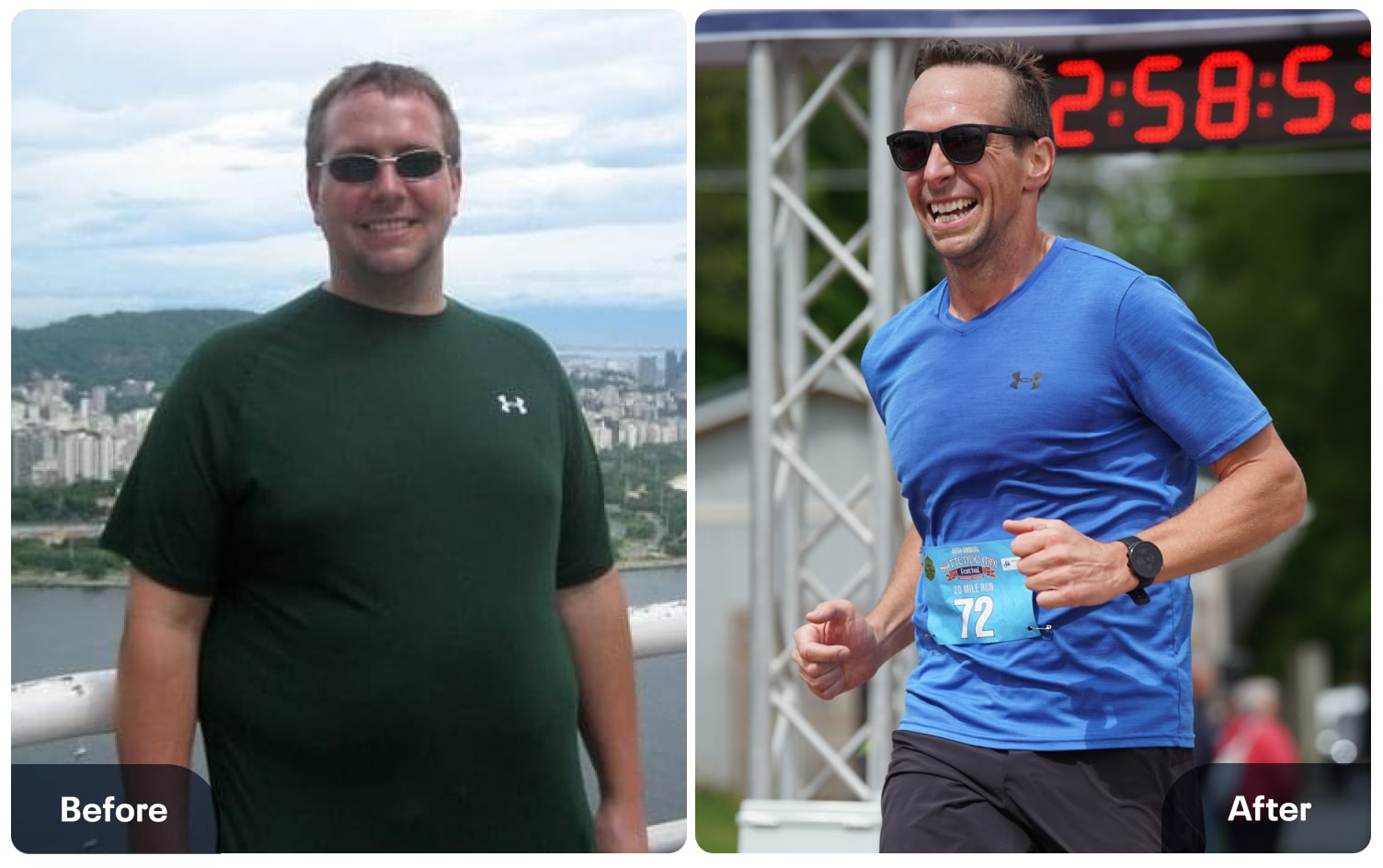It takes a special type of person to run a marathon. It’s not something you can get off the couch and casually complete; it takes months of training and a serious amount of mental fortitude to cross the finish line after 26.2 miles.
For 41-year-old data analytics manager Eric Kotleski from Madison, Wisconsin, completing a marathon — let alone seven — was never something he considered possible.
At his heaviest, Kotleski weighed 333 pounds in August 2012. His diet consisted of anything convenient and easy, including lots of fast food, soda, cigarettes and alcohol — far from the ideal habits and diet required to run a marathon.
His weight had always fluctuated dramatically, but he recalls one specific moment that triggered a lasting mental switch, kickstarting his weight loss and, indirectly, marathon journey.
“I was in a friend’s wedding and was getting fitted for a suit, but the suit they had picked wasn’t available in my size,” says Kotleski. “I was like ‘this is out of control, it’s gone too far.’”
Kotleski didn’t set a goal at first, but at the time, he had just started a new job that had a gym in the building and was talked into doing some simple strength-training workouts with a coworker. He found a supportive group of like-minded friends, developed a fitness routine and started tracking his daily activity with a Fitbit.
Then, his wife introduced him to MyFitnessPal, and he began supplementing his new training schedule with tracking daily calories on the app. He also consulted with a nutrition coach, who educated him on proper diet and healthy eating habits.
“MyFitnessPal really accelerated my transformation,” he says. “I’m a data guy and I had already been tracking my activity, but once I started tracking my nutrition, I felt like it all went together and made sense.”
Kotleski’s diet transformed slowly, and he didn’t drop his unhealthy habits all at once — he gradually backed off from his familiar, unhealthy choices and replaced them with cleaner, healthier options.
“I got to my fittest working with my nutrition coach and tracking my macronutrients,” he says. “Now, we’ve been cooking at home, eating a lot cleaner, and eating more fruits, vegetables and lean protein.”
As he was getting into shape and retooling his diet, Kotleski started enjoying casual short runs a couple of days a week. His friend noticed, and talked him into registering for his first half-marathon, which he completed in November 2016.
As he started training regularly with a local running group in Madison, the idea of running a marathon seemed more attainable, and in his words, less “crazy.” In October 2017, Kotleski completed his first 26.2 miles in a respectable time of 4 hours, 24 minutes.
“The first marathon was thrilling and it was a lot of fun,” he says. “I entered with no pressure, I wasn’t shooting for a time, and I ran it easier than I thought I should — and it made for a great experience. It was hard, but I wasn’t hating it at the end, and I wasn’t disappointed in myself for not hitting a specific time.”
With Kotleski now training for and racing marathons, he had to readjust not only his daily caloric intake but his daily macronutrients to better support his endurance-based lifestyle. He started setting daily goals in MyFitnessPal that directly correlated with his training load.
“Setting daily goals was another feature I really got into. My nutrition coach showed me that your needs change each day,” he says. “For instance when I’m doing a 20-mile long training run on a Saturday, my daily carb intake should be higher. I really feel a difference when measuring and setting these goals.”
CLICK TO TWEET THIS ARTICLE > What started as Eric’s simple food-tracking and occasional runs turned into 140 pounds dropped and seven completed marathons. @MyFitnessPal #weightloss #running
Kotleski caught the marathon bug after his first finish in a major way. He completed his seventh marathon in June 2021, and not only did he set a new PR of 3 hours, 31 minutes, but he also reached a new all-time low weight of 192 pounds. His long-term goal is to qualify for the Boston Marathon, an achievement he believes he can reach in the next few years.
It wasn’t all smooth sailing, though, and Kotleski admits there will still be setbacks along the way — especially with his mental health. He’s gone through bouts of depression due to seasonal and work stress where he wants to drink more and exercise less, which causes fluctuations in both his weight and motivation.
“I’ve found that if I keep training consistently, I keep trending the right way,” he says. “I have enough experience to know that you have to ride through those waves. I still have days where I have body image issues, but overall it keeps moving in the right direction, and running helps significantly with my mental health.”
Acceptance for him has been the secret to his entire journey. Kotleski learned to accept himself and where he started weight-wise, which made setting and reaching long-term goals feel more attainable.
“I’m good, I’m healthy, and I’m going to get a little better tomorrow and the day after that,” he says. “Just do smaller things that are more sustainable; you don’t have to change and fix everything today. It was a very conscious thing — it was a journey to get to 330 pounds, and it only makes sense that it’ll be a journey to make it better.”
Inspired by the success of real MyFitnessPal users? Now it’s time to reach your own goals! Take the next step in your journey and go Premium for exclusive tools and guidance from our experts that will help you achieve any goal.




